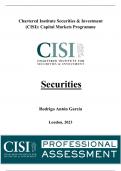Chartered Institute Securities & Investment
(CISI): Capital Markets Programme
Securities
Rodrigo Antón García
London, 2023
Securities
,Chapter 1 – The Financial Services Industry (3 Questions)
o 1.1 – Introduction.
Financial markets move capital from those that have it to those that need it.
o 1.2 – Professional and Retail Business.
Wholesale/Professional Sector. Business to Business (B2B).
- Equity, Bond and Foreign Exchange Markets.
- Derivatives.
- Insurance Markets. On a CORPORATE LEVEL: General and Life Policies.
- Fund Management. CIS, Pension, Insurance Open vs Closed / Reg vs Unreg.
- Investment Banks. Dealers (Act Account/Principal) & Brokers (Act Client),
Market Making (Liquidity), Research (Corp Fin, M&A, Adv, Fund/ Invest. Managemnt).
- Custodian Banks. Safekeeping and Administration for Portfolios.
- International Banking.
Retail Businesses Sector. Business to Consumer (B2C).
- Retail Banking. Deposits: Saving, ISA; Lending: Loan, Mortgage. Credit Cards.
- Building Society. Similar to Retail Bank activities but Mutually Owned.
- Pension Funds. Hold pension plan assets of workers. Retirement Planning.
- Insurance Company. On a PERSONAL LEVEL: General and Life Policies.
- Investment Services. On a PERSONAL LEVEL: Brokers (Act for Client).
- Custodians. Safekeeping and Administration Services.
- Financial Planning and Wealth Management. Holistic Organization.
Third-party Administrators/Vendors. Offer administration services other participants.
Bloomberg, Thomson Reuters, Third Party Administrator, IT Consultants, Lawyers, etc.
,Industry Trade Bodies. Professional bodies that represent interests of their members.
E.g. ICMA, ISDA, IMA, BBA, APCIMS, etc.
High Net Worth Individual (HNWI).
- Differences Between Debt and Equity.
, Chapter 2 – Asset Classes (27 Questions)
• 2.1 – Equities.
A company issues shares to raise capital. Investors buy a share in the company’s
success (failure). For legal control the company needs more than 50% of ownership.
Shareholders: Owners of company. Delegate responsibility for the day-to-day running
of company to directors. Non-executive directors responsible oversee other directors.
Nominal Value: Fixed legal value of a share.
Share Capital: Number of shares in issue multiplied by the nominal value of shares.
Authorised Share Capital: Maximum amount of capital can be raised through share
issue to existing and new shareholders, valued at nominal value.
Issued Share Capital: Number of shares the company has allotted to shareholders.
Market Capitalisation: Number of shares in issue multiplied by market price share.
Since relative to market share price goes up and down and can be free float adjusted.
Free Float: All shares being held by investors other than:
- Owners holding 5% or more of all shares.
- Restricted Stocks (Pension fund held) and Insider Holdings.
• Types of Equity (Common/Ordinary vs Preference/Preferred).
Ordinary Shares: 2 Priority, No/Variable Dividend, On Profits, Vote Right (No Always).
On liquidation, ordinary shareholders get leftover after all payouts on winding-up.
Preference Shares: 1 Priority, Fixed Dividend, Fixed % against NV. No Voting Right
but can activate (if Dividends not paid for long time). Dividend preference shares
can be waived by board of directors but not vary. No Pre-Emption Rights generally.
On liquidation, preference shareholder get the nominal value share on winding-up.
Note: Lenders & Creditors highest Priority, payment for shareholders is discretionary.
- Special Features: Ordinary Shares.
- A and B Ordinary Shares. Internal Classification. E.g., Varying vote rights.
o Different classes of shares created to separate ownership and control.
- Partly Paid. Issue Method. Share paid in part upfront and remaining later.
o Occasionally, the company may not demand all of the nominal value at
issue, with the shares then referred to as being partly paid.
- Redeemable. Shares that have end date and company can buy back.
o May bought back by company at election. Redeemable shares permitted
to issue, as long as conventional non-redeemable ordinary shares are also in issue.




